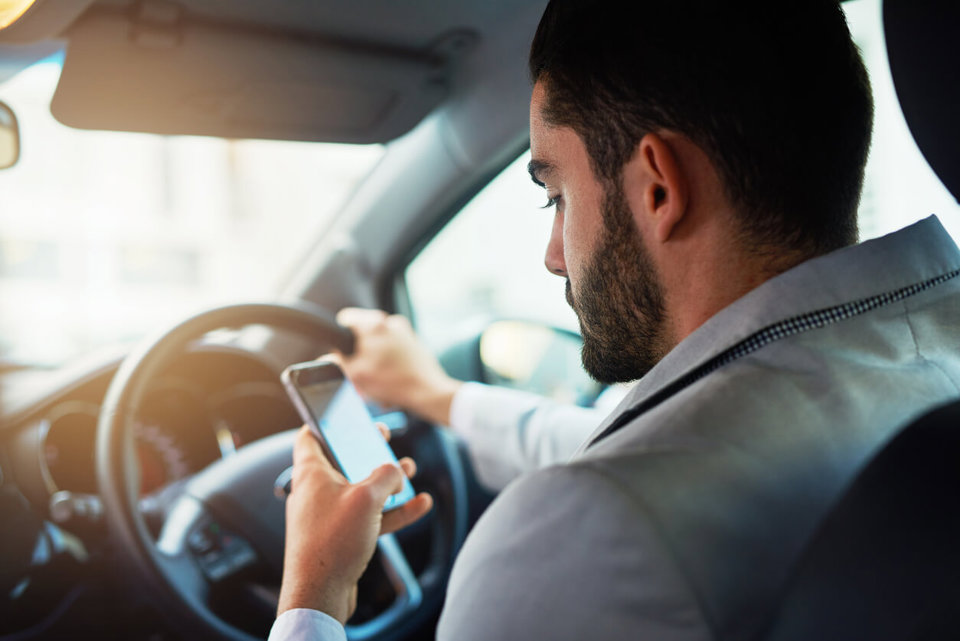A survey has revealed that nearly three in 10 drivers (28%) texts at the wheel and one in 13 (8%) do this at least once a week. Meanwhile, one in 11 drivers (9%) surfs the web, emails, uses apps or social networking sites when driving.
In a large-scale study of commercial drivers, which monitored the impact of them texting at the wheel, their crash risk increased to 23 times that of a driver paying full attention, while studies looking at the impact of talking on your mobile at the wheel have found crash risk is quadrupled, whether you're on a hand-held or hands-free phone.
In the United States, death from distracted driving has been increasing and researchers put this down to increases in drivers using smartphone technology.
A recent Ofcom report warned of increasing levels of smartphone addiction in the UK by users who are unable to go without checking their phone even for short periods or through the night. Over a quarter of adults and nearly half of teenagers now own a smartphone and the volume of mobile data transferred over the UK's mobile networks has increased forty-fold between 2007 and 2010.
Julie Townsend, Brake campaigns director, said: "People who text, use the web or social networking when driving are taking enormous risks with their own and other people's lives. This kind of irresponsible behaviour is illegal and it kills so there should be no excuses.
“We are concerned that the increasing uptake of this technology could lead to more crashes and casualties caused by distracted drivers, as is happening in the US. It is vital that the Government acts now to prevent an upsurge in distracted driving, and it's vital that drivers listen to these warnings and make a pledge to never use their phone when driving."
Frances Browning, spokesperson for Direct Line Car Insurance, said: "Mobile phone technology has become such an intrinsic part of our lives, that many drivers feel it is perfectly acceptable to drive whilst talking, texting, emailing or even surfing the web on their phone. It isn't and there is no excuse to undertake these activities.
“No call or text is that important to risk your own life or the lives of others. The way to reduce any temptation to use your phone or answer a call is simple, switch it off when you're behind the wheel."
Brake and Direct Line warn driver distraction from mobile phones could rise as technology uptake rapidly increases and smartphone addiction becomes more common. More drivers being distracted at the wheel could lead to more deaths and injuries on UK roads, leaving more families to deal with the horror of a sudden and violent casualty.
Texting distracts from driving cognitively, physically and visually. But increasingly people are using their phones to do much more than make calls and send SMS messages: responding to emails, social networking, inputting navigational data or using other mobile phone applications.
Research into the impact of sending or receiving text messages among young drivers found the amount of time drivers spent with their eyes off the road increased by up to 400%. Drivers made 28% more lane excursions and 140% more incorrect lane changes.
It is illegal to drive a vehicle or ride a motorcycle while using a hand-held mobile phone, smartphone or PDA. It is illegal to use any kind of electronic device to send or receive spoken or written messages or still or moving images or access the internet. This includes when stopped at traffic lights or queued in traffic.
Drivers who are caught will received a fixed penalty notice of £60 and three points on their licence. In May 2011 the government announced this fine is due to increase to £80 - £100. In some cases drivers will have to go to court and could face disqualification and a maximum fine of £1,000.
But it could be much worse. Using a phone at the wheel can and does lead to devastating crashes. If you kill someone while using a phone you could face up to 14 years in prison for causing death by dangerous driving, as well as the knowledge that someone died because of your decision to pick up your phone at the wheel.

















Login to comment
Comments
No comments have been made yet.